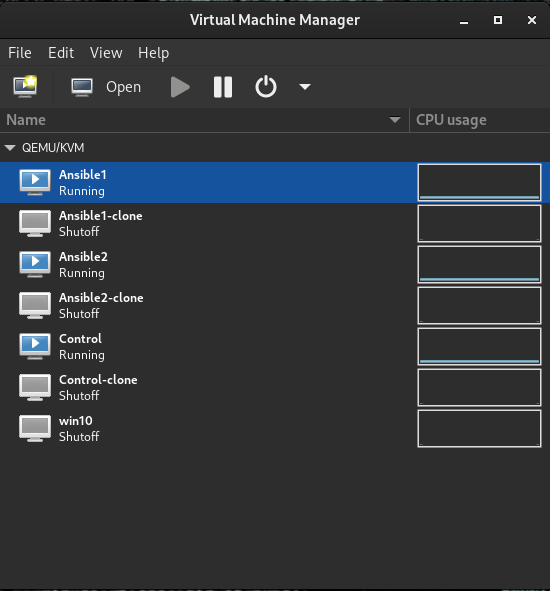Setting up an Ansible Lab
Requirements for Ansible
- Python 3 on control node and managed nodes
- sudo ssh access to managed nodes
- Ansible installed on the Control node
Lab Setup
For this lab, we will need three virtual machines using RHEL 9. 1 control node and 2 managed nodes. Use IP addresses based on your lab network environment:
Setting hostnames and verifying dependencies
Set a hostname on all three machines:
[root@localhost ~]# hostnamectl set-hostname control.example.com
[root@localhost ~]# hostnamectl set-hostname --pretty controlInstall Ansible on Control Node
[root@localhost ~]# dnf -y install ansible-core
...Verify python3 is installed:
[root@localhost ~]# python --version
Python 3.9.18Configure Ansible user and SSH
Add a user for Ansible. This can be any username you like, but we will use “ansible” as our lab user. Also, the ansible user needs sudo access. We will also make it so no password is required for convenience. You will need to do this on the control node and both managed nodes:
[root@control ~]# useradd ansible
[root@control ~]# visudoAdd this line to the file that comes up:
ansible ALL=(ALL) NOPASSWD: ALL
Configure a password for the ansible user:
[root@control ~]# passwd ansible
Changing password for user ansible.
New password:
BAD PASSWORD: The password is shorter than 8 characters
Retype new password:
passwd: all authentication tokens updated successfully.On the control node only: Add host names of the nodes to /etc/hosts:
echo "192.168.124.201 ansible1 >> /etc/hosts
> ^C
[root@control ~]# echo "192.168.124.201 ansible1" >> /etc/hosts
[root@control ~]# echo "192.168.124.202 ansible2" >> /etc/hosts
[root@control ~]# cat /etc/hosts
127.0.0.1 localhost localhost.localdomain localhost4 localhost4.localdomain4
::1 localhost localhost.localdomain localhost6 localhost6.localdomain6
192.168.124.201 ansible1
192.168.124.202 ansible2Log in to the ansible user account for the remaining steps. Note, Ansible assumes passwordless (key-based) login for ssh. If you insist on using passwords, add the –ask-pass (-k) flag to your Ansible commands. (This may require sshpass package to work)
On the control node only: Generate an ssh key to send to the hosts for passwordless Login:
[ansible@control ~]$ ssh-keygen -N "" -q
Enter file in which to save the key (/home/ansible/.ssh/id_rsa): Copy the public key to the nodes and test passwordless access and test passwordless login to the managed nodes:
^C[ansible@control ~]$ ssh-copy-id ansible@ansible1
/usr/bin/ssh-copy-id: INFO: Source of key(s) to be installed: "/home/ansible/.ssh/id_rsa.pub"
/usr/bin/ssh-copy-id: INFO: attempting to log in with the new key(s), to filter out any that are already installed
/usr/bin/ssh-copy-id: INFO: 1 key(s) remain to be installed -- if you are prompted now it is to install the new keys
ansible@ansible1's password:
Number of key(s) added: 1
Now try logging into the machine, with: "ssh 'ansible@ansible1'"
and check to make sure that only the key(s) you wanted were added.
[ansible@control ~]$ ssh-copy-id ansible@ansible2
/usr/bin/ssh-copy-id: INFO: Source of key(s) to be installed: "/home/ansible/.ssh/id_rsa.pub"
The authenticity of host 'ansible2 (192.168.124.202)' can't be established.
ED25519 key fingerprint is SHA256:r47sLc/WzVA4W4ifKk6w1gTnxB3Iim8K2K0KB82X9yo.
This key is not known by any other names
Are you sure you want to continue connecting (yes/no/[fingerprint])? yes
/usr/bin/ssh-copy-id: INFO: attempting to log in with the new key(s), to filter out any that are already installed
/usr/bin/ssh-copy-id: INFO: 1 key(s) remain to be installed -- if you are prompted now it is to install the new keys
ansible@ansible2's password:
Number of key(s) added: 1
Now try logging into the machine, with: "ssh 'ansible@ansible2'"
and check to make sure that only the key(s) you wanted were added.
[ansible@control ~]$ ssh ansible1
Register this system with Red Hat Insights: insights-client --register
Create an account or view all your systems at https://red.ht/insights-dashboard
Last failed login: Thu Apr 3 05:34:20 MST 2025 from 192.168.124.200 on ssh:notty
There was 1 failed login attempt since the last successful login.
[ansible@ansible1 ~]$
logout
Connection to ansible1 closed.
[ansible@control ~]$ ssh ansible2
Register this system with Red Hat Insights: insights-client --register
Create an account or view all your systems at https://red.ht/insights-dashboard
[ansible@ansible2 ~]$
logout
Connection to ansible2 closed.Install lab stuff from the RHCE guide:
sudo dnf -y install git
[ansible@control base]$ cd
[ansible@control ~]$ git clone https://github.com/sandervanvugt/rhce8-book
Cloning into 'rhce8-book'...
remote: Enumerating objects: 283, done.
remote: Counting objects: 100% (283/283), done.
remote: Compressing objects: 100% (233/233), done.
remote: Total 283 (delta 27), reused 278 (delta 24), pack-reused 0 (from 0)
Receiving objects: 100% (283/283), 62.79 KiB | 357.00 KiB/s, done.
Resolving deltas: 100% (27/27), done.